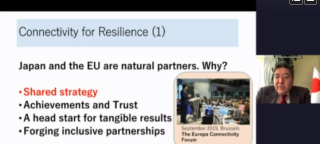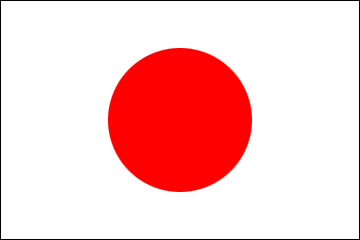Ambassador Masaki's attendance to the Foreign Affairs Committee of the European Parliament (AFET)
2021/4/14

Rules-based international order and Connectivity in the Indo-Pacific: Ambassador Masaki and MEPs agreed that Japan and the EU should strengthen work for their shared strategic goals
On April 13th, Ambassador Yasushi Masaki attended the Foreign Affairs Committee of the European Parliament (AFET), where he discussed the future of the strategic partnership between Japan and the EU with the committee members as well as members of the Delegation for relations with Japan. Also present was Mr. Gunnar Wiegand, Managing Director for Asia and the Pacific as a representative from the European External Action Service (EEAS).
While recalling the critical importance for Japan and the EU to work together on common priorities including the green and digital transitions, Ambassador Masaki welcomed Europe’s increasing interest in the Indo-Pacific and stressed the urgency for like-minded partners, including Japan, the EU, regional partners such as ASEAN and the Quad members, to join hands to preserve the established rules-based international order in the region. He explained that while positive developments can be seen, including the launch of the CPTPP and the RCEP, the rules-based international order is increasingly being challenged, including by the developments in the South China Sea and the East China Sea, and the deteriorating human rights situation in the region, all of which are having global implications. Ambassador Masaki also stressed the urgency of working on sustainable connectivity in the Indo-Pacific, which is essential for the region to become resilient and to remain an open, free and vibrant region, in other words, a "Free and Open Indo-Pacific" as advocated by Japan.
Ambassador Masaki then emphasized that Japan and the EU, as strategic partners sharing values and principles, should double down on their joint efforts to make progress towards these shared goals. He emphasised Japan's decades-long experience in developing connectivity in the Indo-Pacific and beyond, including in Africa, by working closely with and supporting the own initiatives of respective regional partners. The tangible achievements of these decades-long exercises form a solid foundation on which Japan and the EU can build their future work. He reminded the MEPs that Japan and the EU have a long shared history of developing together international narratives and principles for connectivity, as confirmed in the agreement, "Japan-EU Partnership on Sustainable Connectivity and Quality Infrastructure" (September 2019), as well as of forging inclusive partnerships worldwide, including with the US and China, as was the case in the adoption of the "G20 Principles for Quality Infrastructure" and the concept of "Data Free Flow with Trust" during the 2019 G20 Osaka Summit under the Japanese presidency. He also referred to the increasing cooperation between Japan and Europe in the area of maritime security, as exemplified in last October's joint anti-piracy exercise in the Bay of Aden and a joint port call on Djibouti by Japanese self-defense forces and EU NAVFOR.
His statement was echoed by the MEPs who took the floor, expressing their strong expectations for the partnership between Japan and the EU to deliver on their respective and shared strategic interests, in terms of connectivity, the Indo-Pacific, multilateral rules-based order, human rights and democratic principles, as well as the green and digital transitions. There were suggestions for the necessity to expedite the operationalization of the partnership between Japan and the EU on connectivity in the form of concrete joint projects, as well as questions regarding issues such as human rights, China, Corona virus, maritime security and the green transitions. Ambassador Masaki and the MEPs engaged in a discussion, and concurred on the need for a continued dialogue between Japan and the EU to closely coordinate strategies and actions, including at the parliamentary level.
The view the discussion (recorded), please click the following link:
https://multimedia.europarl.europa.eu/en/committee-on-foreign-affairs_20210413-1345-COMMITTEE-AFET_vd
On April 13th, Ambassador Yasushi Masaki attended the Foreign Affairs Committee of the European Parliament (AFET), where he discussed the future of the strategic partnership between Japan and the EU with the committee members as well as members of the Delegation for relations with Japan. Also present was Mr. Gunnar Wiegand, Managing Director for Asia and the Pacific as a representative from the European External Action Service (EEAS).
While recalling the critical importance for Japan and the EU to work together on common priorities including the green and digital transitions, Ambassador Masaki welcomed Europe’s increasing interest in the Indo-Pacific and stressed the urgency for like-minded partners, including Japan, the EU, regional partners such as ASEAN and the Quad members, to join hands to preserve the established rules-based international order in the region. He explained that while positive developments can be seen, including the launch of the CPTPP and the RCEP, the rules-based international order is increasingly being challenged, including by the developments in the South China Sea and the East China Sea, and the deteriorating human rights situation in the region, all of which are having global implications. Ambassador Masaki also stressed the urgency of working on sustainable connectivity in the Indo-Pacific, which is essential for the region to become resilient and to remain an open, free and vibrant region, in other words, a "Free and Open Indo-Pacific" as advocated by Japan.
Ambassador Masaki then emphasized that Japan and the EU, as strategic partners sharing values and principles, should double down on their joint efforts to make progress towards these shared goals. He emphasised Japan's decades-long experience in developing connectivity in the Indo-Pacific and beyond, including in Africa, by working closely with and supporting the own initiatives of respective regional partners. The tangible achievements of these decades-long exercises form a solid foundation on which Japan and the EU can build their future work. He reminded the MEPs that Japan and the EU have a long shared history of developing together international narratives and principles for connectivity, as confirmed in the agreement, "Japan-EU Partnership on Sustainable Connectivity and Quality Infrastructure" (September 2019), as well as of forging inclusive partnerships worldwide, including with the US and China, as was the case in the adoption of the "G20 Principles for Quality Infrastructure" and the concept of "Data Free Flow with Trust" during the 2019 G20 Osaka Summit under the Japanese presidency. He also referred to the increasing cooperation between Japan and Europe in the area of maritime security, as exemplified in last October's joint anti-piracy exercise in the Bay of Aden and a joint port call on Djibouti by Japanese self-defense forces and EU NAVFOR.
His statement was echoed by the MEPs who took the floor, expressing their strong expectations for the partnership between Japan and the EU to deliver on their respective and shared strategic interests, in terms of connectivity, the Indo-Pacific, multilateral rules-based order, human rights and democratic principles, as well as the green and digital transitions. There were suggestions for the necessity to expedite the operationalization of the partnership between Japan and the EU on connectivity in the form of concrete joint projects, as well as questions regarding issues such as human rights, China, Corona virus, maritime security and the green transitions. Ambassador Masaki and the MEPs engaged in a discussion, and concurred on the need for a continued dialogue between Japan and the EU to closely coordinate strategies and actions, including at the parliamentary level.
The view the discussion (recorded), please click the following link:
https://multimedia.europarl.europa.eu/en/committee-on-foreign-affairs_20210413-1345-COMMITTEE-AFET_vd
